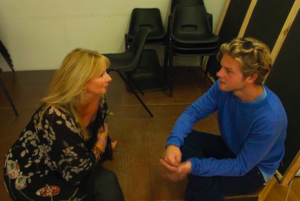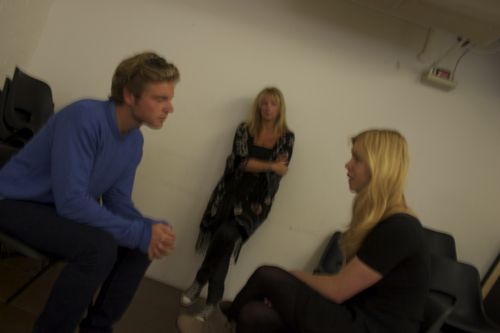
Making Shakespeare Real at Audition Doctor
 Last Sunday Mark Rylance spoke on Desert Island Discs about how “acting is a mixture of reaching out to people, which I would call a kind of electric thing, you have to stir and engage their imagination at times and at other times you have to be more like a magnet and draw them towards you. It’s really about hiding and revealing.”
Last Sunday Mark Rylance spoke on Desert Island Discs about how “acting is a mixture of reaching out to people, which I would call a kind of electric thing, you have to stir and engage their imagination at times and at other times you have to be more like a magnet and draw them towards you. It’s really about hiding and revealing.”
Professional as well as aspiring actors have found Audition Doctor to be vital in the quest for achieving an equilibrium between these two seemingly contradictory principles. Although difficult to achieve, its purpose is simple – as Shane Zaza (currently in Behind the Beautiful Forevers at the National) put it recently – to “say the words and make it seem real. Make it sound like it’s not part of the script and that what you are doing is the truth.” In other words, clarity of emotion and thought.
Many students come to Audition Doctor because of their fear of Shakespeare – initially speeches are seemingly opaque and incommunicable. Even Olivia Colman admitted a “sense of inadequacy” when it came to Shakespeare: “I find Shakespeare terrifying. When Simon Russell Beale does a speech I understand every word of it, but if I did the same speech people would be going ‘Huh? What?’”
It’s therefore gratifying to discover that Simon Russell Beale puts comprehensibility above all else. In an article in the Guardian this week, he said: “You can do what you like with [the text] – as long as you make coherent, emotional sense…I see absolutely no problem in throwing Shakespeare around”. The purpose of any play is to affect an audience, the reason why Shakespeare is still routinely performed is because the trials and experiences that the characters face are still recognisable to audiences today. Audition Doctor sessions make you realise that Shakespearean language is actually the actor’s greatest tool in “[making] these great literary dramas real and contemporary”.
In Audition Doctor sessions, nothing is immutable. Students realise session by session that Shakespeare speeches that initially started off being performed stiltedly and dispassionately cease being these untouchable museum pieces. Instead they breathe and come alive and fulfil their original intention of eliciting a real and true response from their audience.
The freedom to experiment that characterises Audition Doctor’s method of working reflects the attitudes of many established theatre practitioners. Deborah Warner encouraged actors and directors to “Do whatever you want … with the texts … You must cut to create new work.”
Rylance mentioned that “You must act exactly the same on stage as in front of the camera in terms of whether your emotions are truly felt, whether you are thinking things through and discovering things.” While there are variable technicalities that have to be obeyed when acting in different mediums, the authenticity of intention and feeling behind each line is a constant.
Mastering this takes an inordinate amount of learning and practice. There are places other than drama school, such as Audition Doctor, where this is achievable. However, many of Audition Doctor’s students are professional actors who have been to drama school and use Audition Doctor to continue to expand their abilities. Training at an accredited drama school is still viewed by those in the industry as the safest option.
In yesterday’s Guardian, Rebecca Atkinson-Lorde wrote: “The industry is competitive and, because of the cultural devaluation of vocational training for the majority of kids who want to work in theatre, the best way to build the skills and contacts you need is by training at a good drama school…” which is why Audition Doctor continues to be increasingly needed by drama school applicants and professionals alike.



